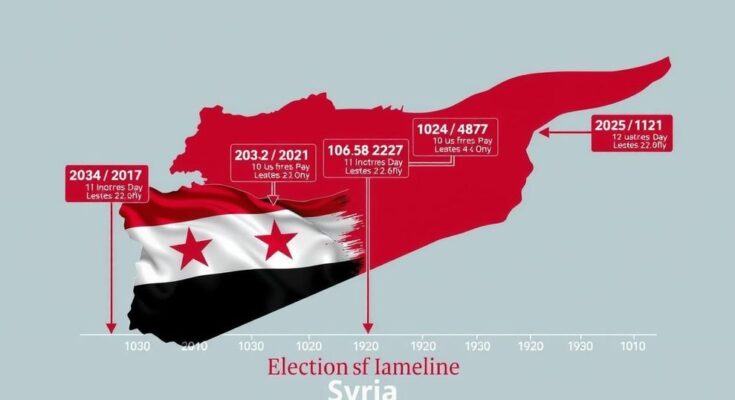Ahmed al-Sharaa, Syria’s de facto leader, indicated that elections could take up to four years due to necessary preparations, including a new census and constitution drafting. He expressed optimism for significant changes within a year, reaffirmed Syria’s commitment to peace, and highlighted ongoing strategic relations with Russia.
Ahmed al-Sharaa, the de facto leader of Syria, indicated that elections in the war-torn nation could take as long as four years to materialize. This statement marks al-Sharaa’s first public commentary on the electoral timeline since opposition forces, under his leadership in Hayat Tahrir al-Sham (HTS), successfully displaced former President Bashar al-Assad. He emphasized the importance of conducting a comprehensive population census to ascertain the number of eligible voters prior to any elections, which he estimates would likely follow a three-year period dedicated to drafting a new constitution.
Al-Sharaa conveyed optimism regarding notable transformations in Syria expected within a year, with plans to dissolve HTS during a forthcoming national dialogue conference. Moreover, he reassured neighboring countries about the intention of his new government to maintain peace and stability within the multiethnic nation. He stated, “Syria will not be a source of disturbance to anyone.” Additionally, he expressed hope that the incoming administration of President-elect Donald Trump might reconsider and retract the sanctions placed on Syria.
In light of Syria’s evolving political landscape, al-Sharaa addressed the strategic partnership with Russia, reiterating that the ongoing collaboration should prioritize mutual interests. Russian Foreign Minister Sergey Lavrov mentioned that negotiations regarding the status of Russian military bases in Syria would be ongoing with the new Syrian leadership. Moreover, al-Sharaa’s interaction with senior U.S. diplomats has portrayed him as pragmatic, as evidenced by Washington’s decision to rescind a bounty on the HTS leader.
The current status of Syria reflects a significant shift in political dynamics following the ousting of Bashar al-Assad by opposition forces, primarily represented by Hayat Tahrir al-Sham (HTS). Under Ahmed al-Sharaa’s leadership, the new government is positioned to navigate complex issues, such as the implementation of a new electoral framework, the drafting of a constitution, and the need for a comprehensive population census—essential for legitimizing electoral processes. The international community, particularly the United States and Russia, plays a crucial role in shaping the future of Syria as the newly established leadership aims for stability and potential economic recovery.
In conclusion, the statements made by Ahmed al-Sharaa regarding the electoral timeline and future stability in Syria highlight the depth of the challenges faced by the new government. With the potential for significant reforms over the next several years, the successful implementation of a census and constitutional drafting will be pivotal in paving the way for legitimate elections. The assurances of peace toward neighboring countries and the intention to maintain strategic partnerships, particularly with Russia, further underscore the pragmatic approach of the al-Sharaa administration as it strives to foster a peaceful and stable Syria.
Original Source: www.aljazeera.com




